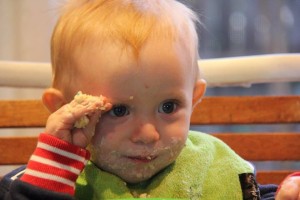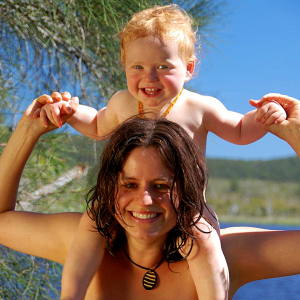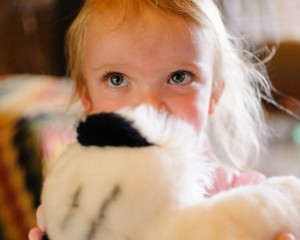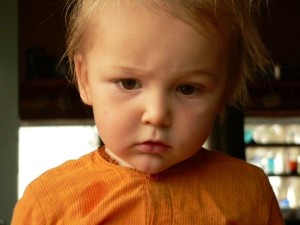One Year Olds
Background: The Gesell Institute of Child Development has observed that children go through a repeating sequence of six different stages with predictable changes in mood and behaviour in each. One year (from age One to Two) includes four such stages, each approximately three months long. The behaviour observed in these stages reflects the qualities associated in tradition with the planets—with Venus, Mars, Jupiter and Saturn qualities respectively. The developmental traits in these profiles represent only one aspect of children’s behaviour and may be masked, modified or intensified by other factors, both individual and environmental, such as temperament, gender related behaviours, high stress levels, over-stimulation, too much screen time or organic problems.
Note: If your child has turned a particular age but shows none of the behaviours described, please read the previous age level, or just wait a few weeks, then read this again!
These profiles integrate the wonderful descriptions from the Gesell Institute of Child Development research and the ideas of Rudolf Steiner into my own research. Direct quotations from Gesell are indented or in ‘single quote marks’.
View/download pdf One
Introduction to One Year
There is so much information to be found elsewhere on development in these early years that this profile will concentrate mainly on the mood and behaviour of toddlers which reflect the planetary qualities, as a means to observe and understand the children better.
In their early writing on the stages in the second year, the Gesell researchers described four stages, which I have found show qualities associated with the planets Venus, Mars, Jupiter and Saturn in that order. In later writings they concentrated on descriptions mainly of 18 months, which they felt was the peak of the egocentric and demanding behaviour that seemed to build up in that year. Nevertheless we can still get a glimpse of the four stages originally named. For example, it is clear that the emphasis on love and relationship expected from a Venus stage is to be found in the Twelve month old whom they describe as an ‘extremely loveable little person—friendly, sociable, amenable…[who] adapts rather easily to whatever it is the adult caretaker has in mind.’ The next two stages at Fifteen and Eighteen months show more independent challenging behaviours and reflect some of the qualities of Mars and Jupiter. There are also small glimpses of the self-contained, sensitive qualities of Saturn in Twenty One months.
Twelve to Fifteen months
A stage with Venus qualities
The first stage in this year has the characteristics of the Gesell Stage 3, and is tentatively timed at Twelve to Fifteen months. Stage 3 is characterised as being in equilibrium, rounded and well balanced. This is the stage which we have found has an association with Venus qualities.
At approximately Twelve to Fifteen months we certainly see qualities and motivations traditionally associated with Venus, with a priority for loving relationships. The Gesell researchers describe this in their book Your One Year Old. Fun-loving and Fussy:
At the time of his important first birthday your infant is a treasure and a joy to all concerned. Your typical Twelve month-old tends to be an extremely loveable little person—friendly, sociable, amenable. Given a reasonably favourable personality, normally good health, and a modestly supportive environment, most One-year-olds seem to adapt rather easily to whatever it is the adult caretaker has in mind. The year old baby loves an audience. This is one reason why he is so often the very center of a household group. He likes to repeat performances laughed at….Your applause seems to help him sense his own identity. He is defining a difficult psychological distinction—the difference between himself and others.
And he is capable of primitive kinds of affection, jealousy, sympathy, anxiety. He may be responsive to rhythm. He may even show a very slight sense of humour, for he laughs at abrupt surprise sounds and at startling incongruities. Fifty two weeks is clearly the heyday of sociability. He enjoys his carriage ride …hiding behind chairs to play “Where’s the baby?”… bath is usually very much enjoyed…[he is] usually quite easy to dress—giving little difficulty….Behaviour-wise, the time of the first birthday is not a particularly significant turning point.
This easiness and amenability does not last but is consistent (in its sociability) with Venus influence. By Fifteen months, the next Gesell stage, (Mars) behaviour becomes more challenging!
Fifteen to Eighteen months
A stage with Mars qualities
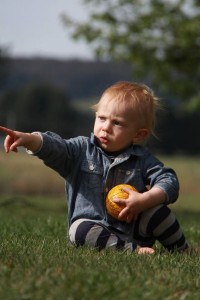 The next stage, which had the characteristics which Gesell named Stage 4, manifests from Fifteen to Eighteen months. Stage 4 is characterised as being in disequilibrium and inwardised. This is the stage which we have found has an association with Mars qualities.
The next stage, which had the characteristics which Gesell named Stage 4, manifests from Fifteen to Eighteen months. Stage 4 is characterised as being in disequilibrium and inwardised. This is the stage which we have found has an association with Mars qualities.
What we see of the mood of planetary-influenced behaviours in this stage may still be difficult to separate from other development. Children of this age still have limited language and social skills. In general, the information given by Gesell on Fifteen Months is scant, but still reflects a little of the sort of possible Mars behaviour seen at this stage: increasing independence, more interest in the task at hand than being sociable, and a particular interest in movement of himself and of objects!!
Quoting directly again from the Gesell research in Your One Year Old. Fun-loving and Fussy:
The fifteen-month-old boy or girl often seems very busy just becoming…The child of this age is beginning to want to do things himself, often things he really can not quite manage. He is also very demanding.—may insist on having his dish on his tray, even though he may keep throwing it to the floor. But he is as demanding of himself as of others, so it may be fairer to call him assertive rather than demanding. He is asserting his budding independence….He is not particularly cooperative.
They continue: ‘Your typical Fifteen month–old is not primarily a people person. Except that they take care of his many needs—especially as they push him in his carriage—he could do pretty well without them.’ This is somewhat reminiscent of the accusation about the immature Mars type, that they use people merely as instruments to achieve their tasks. Gesell researchers continue: ‘He does as a rule accept his mother’s help in daily routines—eating, dressing, bathing— though even here he tends either to take help for granted or to resist bitterly.’ ‘On his favourite carriage ride he pays virtually no attention to the person pushing him, beyond expressing displeasure if the ride should come to a halt for even a minute. With other children, he for the most part pays very little attention to those about him, except he may grab for whatever they may be playing with.’ ‘Some Fifteen months-old are so asocial that they will not even accept something, say, a cracker, directly from the hand of an adult. They would much prefer to take it from a dish.’
Gesell researchers continue: ‘For the most part the boy or girl of this age tends to be independent, undemonstrative, concerned more with his or her own needs and wishes than those of some other person either adult or child.’ ‘Though many at this age treat their carers more or less as part of the furniture, they are not without personal charm… ’ In the context of a Mars stage, all this behaviour may be driven more by wanting to initiate the action, being focussed on the task and being independent than an actual rejection of people.
We also see Mars in the uninhibited driving force that shows itself in their tendency to grab and throw everything that comes their way in their explorations! ‘With his characteristic lack of inhibition, the Fifteen-month-old may be lost in the confusion of the living room since he tends to grab anything in sight…. Motor drive, need to grab, and a lack of inhibition makes the child of this age at least a modest menace unless he is…restrained.’ ‘Fifteen months is in many the high point for throwing behaviour. The baby just naturally throws anything he can get his hands on…what he really likes is to throw things then have you get them and give them back to him.’
Is this the joy in the directed force of throwing, or the power of direct movement associated with Mars thrusting movement, which gives them the impulse to throw every object out of their cots while they wait for you to come to them? On love of movement, active or passive they say: ‘Much as they like to walk, many still very much like to be carried’ and will ask to be so, arms stretched up. They also love the passive movement of being taken for a walk in a stroller. In regard to helpful tactics to deal with Fifteen months olds’ behaviour Gesell researchers advise: ‘Gross motor activity may be his best outlet. Fortunately many children do not have to be actually moving themselves. They may be content with long car or carriage rides. A child who can be extremely difficult at home will often sit for a good hour or more while being wheeled in his stroller. So take full advantage of the child’s love of motion.’
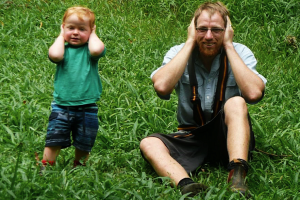
Because the children of this age are so in need of movement and action, the Gesell researchers also give advice on what amounts to using rhythmical movement as a way of giving comfort:
Personal-social relations may not be too useful at this time in making or keeping boy or girl happy. Whereas earlier this child may have been passively content to cuddle or be rocked or sung to, now he is too active to accept what may seem to him like restraint. So a toddler gym, or doorway swing or any object which permit almost constant motion, with, it is hoped, little danger to himself or others, can be a very, very useful thing. Children of this age love to swing or bounce up and down.
A chair swing or hammock that can contain adult and child is a lovely way to combine human comforting with movement needs.
These are the characteristics which most reflect an outward Mars energy: movement, action, focus on the ‘doing’ not people, independence. Awareness of these tendencies may help to inspire the most helpful responses to the children’s behaviour at this age.
Eighteen to Twenty One months
A stage with Jupiter qualities
The next stage, which had the characteristics which Gesell named Stage 5, includes Eighteen to Twenty One months. They characterise Stage 5 as being in equilibrium, vigorous and expansive. This is the stage which we have found appears to have an association with Jupiter qualities.
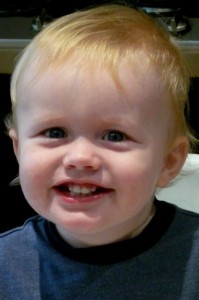 Once again what we see of the mood or gesture reflecting planetary qualities in the behaviours at 18 to 21 months may still be more difficult to separate from other development at this age when children still have limited language and social skills. The information available from Gesell is also still scant, but Eighteen months does show some of the nature of Jupiter. Quoting direct from Gesell:
Once again what we see of the mood or gesture reflecting planetary qualities in the behaviours at 18 to 21 months may still be more difficult to separate from other development at this age when children still have limited language and social skills. The information available from Gesell is also still scant, but Eighteen months does show some of the nature of Jupiter. Quoting direct from Gesell:
The child of Eighteen months not only is motor driven but sometimes seems to be in almost constant motor activity. Watch him as he lugs, tugs, dumps, pushes, pounds, or as he moves the furniture. Here he is both awkward and ambitious, and his child’s chair will often get stuck in a doorway since he is not yet a good judge of space…Out for a walk he climbs onto every curbstone, explores every byway. Gross motor activity still predominates over fine motor behaviour……This whole-bodyiness of behaviour is extremely conspicuous at this age.
…Even though he does not as a rule stay long with any one activity, the typical child of this age is relatively independent. So, if in a happy mood, he can entertain himself for fairly long periods of time.
It is interesting to note here the very determined, will-filled motor activity of this age, perhaps what one would expect of a young child, but the more notable because the later Jupiter ages also show a love of athleticism and ‘muscle power.’ The child’s relative independence also points tentatively towards a Jupiter quality.
Gesell descriptions continue;
Even more than the Fifteen-month-old, your typical Eighteen to Twenty-month-old is a young person of almost unbelievable egocentricity. He is almost all “take” and no “give”. He wants what he wants and he wants it now. He has very little wish to please or to do something just because somebody else wants him to. He is so extremely self-centred that much of the time he does not relate to another person even when asking something of that person…. For the most part adults appear to exist, in his mind, solely to carry out his wishes and demands. Thus his social behaviour consists mostly of his making demands of other people, by either word or gesture.
With most grown-ups, in fact, he is less fun than he used to be…Now, even if you capture him, he tends to straighten out and slide out of your lap. Many are so unsharing, of themselves and of their possessions, that they will not even let you put your hand on the arms of their chairs.
The characteristic self centredness of this age has noticeably increased at Eighteen months. One is reminded of the immature Jupiter weaknesses of conceit and self-indulgence in this. Could the rather objective approach to social relationships be a reflection of Jupiter’s valuing of the task, the end goal, (later the ideal), over relationship and feelings? This behaviour was already starting to be evident in Fifteen months (Mars) but then Mars too has a tendency to put the task before the relationship! While the Jupiter type shows a definite sociableness, openheartedness and is trusted by others, qualities we will also see in the following Jupiter stages, they also show more social independence than some other stages.
The characteristic underlying motivators for both Fifteen months and Eighteen months is power (Mars and Jupiter), rather than love (Moon and Venus) or freedom (Mercury and Saturn). The need for power and freedom in children tend to drive rebellious behaviours if the child feels their independence or autonomy is threatened. In contrast, those stages motivated by the need for love particularly tend to be more people pleasing, more amenable, more affectionate. Not this stage! Eighteen months’ relative self-reliance in occupation and soberness in mood could also perhaps be a faint suggestion of Jupiter, especially in so young a child, although such soberness, which might be seen as seriousness in a mature Jupiter type, is certainly not seen in the following Jupiter stages of Younger Four and Eight Years, which are much more joyous and expansive, perhaps with the discovery of their own power! We would not want to make too much of this, but one can wonder at it!
21 to 24 months
A stage with Saturn qualities
The next stage brings us back to Gesell Stage 6, the stage Gesell characterised in older ages as being in disequilibrium, neurotic, inwardised and troubled. It was associated previously with birth and with standing upright. This is the stage which we have found has an association with Saturn qualities and this can add new understanding to the child of this age.
The Gesell researchers do not provide a great deal of information specifically on this age even in their book Your One Year Old. At this stage it also seems to make a bigger difference at what maturity level the child is at. Gesell researchers say: ‘In some rather advanced boys and girls these [new adaptive abilities] begin clearly around twenty one months of age. In others, they do not make an appearance till the child is well into two.’ The children still have limited language and social skills at 21 months, but there are behaviours which do suggest Saturn qualities.
The Gesell researchers see Stage 6 as one of the least understood stages. Their description of this stage as ‘in disequilibrium, neurotic, inwardised and troubled’ may have some connection with the deep emotional and physical sensitivity, and the tendency to worry and appear moody, that is associated with Saturn. Because these new vulnerabilities are also associated with self- containment, self-protection and inwardness, the beautiful sensitive quality associated with Saturn is not so easily seen and understood, nor fully appreciated in our society where shyness and sensitivity are often seen negatively. One sees a little of the vulnerability in their sensitiveness in the following Gesell description that 21 months was also a time:
… when he tried to be his own protector, when he froze in his own tracks, often from fear. Then he needed reassurance from his parents. With their help he unfroze and grew warm in their loving, understanding care of him. Gradually he clung less and grew more independent. Above all, as he approached Two, he grew more deeply in love with his parents, who became “my mommy” and “my daddy”.
Here we see a Saturn picture—the tendency to self protection, over-sensitivity, frozenness, fear, and needing reassurance to relax and finally be able to respond with deep affection to the love and understanding of his parents.
It is characteristic of 21 months, but not 18 months, that children have more problems with sleep. Given their increasing sensitive awareness, leading to more cautiousness, fears and worries, this is not surprising. They do not always go to sleep at once. They may keep demanding things such as a drink, food or the toilet before they go off to sleep. These bedtime behaviours are commonly signs of fears and the need for more reassurance. Their insecurity is more common at night when there are more threatening aspects to sleep, like the dark and length of time without parent support, for at 21 months they are conscious of adult presence and presumably the lack of it. They are also more sensitive to the stress of change (like holidays), of people (like visitors), threatening weather (like wind and rain), which can make them more clingy and ‘sleep reluctant’ because of their fears. Acknowledgement of these new developmental needs is needed here and a closer adult presence provided for a while, an open door, a light, a parent working, or to be heard singing, close by.
One also sees a cautiousness and less physical adventurousness in excursions in that the children at 21 months often want to hold an adult’s hand on a walk, where before at 18 months they did not want adult physical contact. There is less exploring on the walk at this age. One parent reported her child’s reluctance to go outside and also to get out of the pusher to play with other children. Gesell researchers advised her: ‘Don’t force sociability. Everything has got to be just so for 21 months.’ If we can learn from Saturn qualities, their behaviour suggests that they like time to observe the world and step forward into it only in their own time. They need the security and boundaries that adults can provide because they are less “hardy” because of their extra sensitivity than at some other ages. They need our protection more.
And yet, in Your Two Year Old Gesell researchers write of 21 months as a time:
…when the child seemed to favour the extensor posture. If you tried to take him onto your lap, he would, as likely as not, straighten out and slide down. … [whereas a few months later at Two] if you catch him in the mood, he may curl up and settle in, and talk to you or merely listen.
So despite their need for protection, the child does not want to be confined, a typical characteristic of Saturn.
21 months is also developing an interest in the ability to distinguish ownership of objects, not only what is ‘mine’ but also what is ‘yours’. ‘Many 21 month olds seem almost suddenly highly aware of what belongs to whom.’ With this also comes the idea of place, of where things belong, and they like to put things in their places; also a wish for a special place for the child’s own things. In fact ‘by 21 months self is beginning to be defined by insisting on possessions—‘mine’.’ Perhaps this wish for order and a place for the child’s own things also reflects Saturn a little? This may be an ideal time to introduce the concepts of “things for sharing” and “one’s own things”, as well as “order”, to help with the young child’s difficulty with sharing.
It is interesting that at this time, a time of slowly increasing vocabulary (though girls are more advanced in this than boys), the Gesell researchers observe: ‘But either boys or girls may stand rigid and frozen, if they don’t have the words they need and thus cannot make their wants known.’ Is this a picture of the strong containment of Saturn where it is harder for the children to break through to communicate, especially if they do not have the words?
Another indication of their increasing sensitivity is in their stronger ‘sensation awareness’ seen in the 21 month-old’s food preferences with strong refusals of certain foods.
Much more needs to be observed about this more complex age. An understanding of Saturn qualities may help to bring understanding to it.
Summary
This year has offered an opportunity for very different experiences of the world, beginning with the sociable qualities of Venus and proceeding through the active qualities of Mars and Jupiter and ending with the sometimes puzzling sensitivity of Saturn. At these ages when the children still have very limited use of language to express their needs, an understanding of the planetary qualities and the primary motivations of love (Venus), power in action (Mars and Jupiter) and freedom (Saturn) can help to understand the motivations of the children at these ages better. This understanding can help us to resist the impulse to feel rejected by their somewhat impersonal task orientation at one stage, or irritated by their apparent oversensitivity in another, and recognise that “this is just another stage”. It helps to remember that these stages offer important opportunities to experience different “ways of being” in their development. At Two years the children return again to the amenable smooth next stage with qualities associated with Moon, Gesell’s Stage 1.
View/download pdf One
Further Reading
Bates Ames, Louise, Ilg, Frances L, Chase Haber, Carol, Your One Year Old. Fun-loving and Fussy (Dell Trade Paperback, New York 1982) A Gesell Institute of Child Development book.
Payne, Kim John, with Lisa M. Ross Simplicity Parenting Using the Extraordinary Power of Less to Raise Calmer, Happier and More Secure kids (Ballantine Books Trade Paperbacks, New York, 2009) Or www.simplicityparenting.com/
See also
Avoiding trouble with young children
Healthy play
Two year olds
Brief descriptions of planetary qualities
